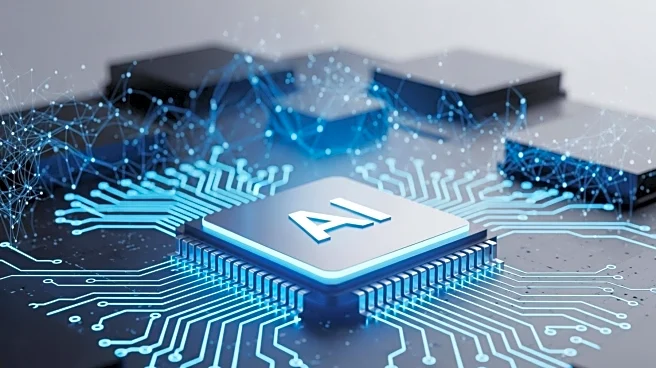What's Happening?
OpenAI has announced a multiyear agreement with Broadcom to collaborate on the development of custom chips and networking equipment. This partnership aims to enhance OpenAI's computing infrastructure by adding 10 gigawatts of AI data center capacity. The collaboration involves designing hardware that integrates OpenAI's AI model insights directly into the chips, which is expected to improve efficiency and performance. The deployment of these custom servers is scheduled to begin in the second half of 2026, with completion by the end of 2029. This move is part of OpenAI's broader strategy to ease constraints on computing power, following significant investments from Nvidia and AMD.
Why It's Important?
The partnership between OpenAI and Broadcom is significant as it represents a strategic move to scale AI infrastructure, which is crucial for the advancement of AI technologies. By customizing chips, OpenAI aims to achieve faster and more efficient AI models, potentially leading to cheaper services. This development could position OpenAI as a leader in the AI industry, influencing market dynamics and competitive strategies. For Broadcom, the partnership deepens its involvement in the AI sector, potentially boosting its market share and stock value. The collaboration also highlights the growing demand for specialized hardware in AI applications, which could drive innovation and investment in the semiconductor industry.
What's Next?
The deployment of custom AI chips and networking equipment is expected to begin in 2026, with full implementation by 2029. As OpenAI continues to expand its infrastructure, it may explore additional partnerships or investments to further enhance its capabilities. The success of this initiative could lead to broader adoption of custom hardware solutions in the AI industry, prompting other companies to pursue similar strategies. Stakeholders, including cloud computing partners and AI service providers, will likely monitor the progress and impact of this collaboration closely.
Beyond the Headlines
The partnership raises questions about the long-term implications of custom hardware in AI development. By embedding AI model insights directly into chips, OpenAI could set a precedent for integrating software and hardware, potentially leading to new standards in AI infrastructure. This approach may also influence ethical considerations, such as data privacy and security, as AI systems become more integrated and powerful. Additionally, the collaboration could impact global semiconductor supply chains, as demand for specialized components increases.









